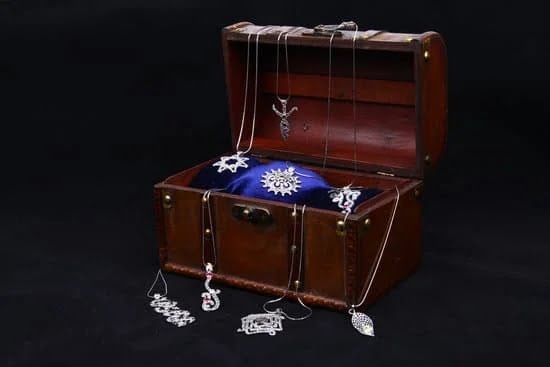Ketchup is a condiment that many people enjoy with their favorite foods. It has the power to elevate an ordinary dish and can provide additional flavor and spiciness.However, did you know that ketchup can also be used as jewelry cleaner? Yes, this kitchen staple is far more versatile than most people realize.
The acidic content in ketchup makes it ideal for cleaning jewelry such as silver and gold pieces, particularly those with old tarnish. Acid helps break down particles of dirt that builds-up on jewellery over time. As an added bonus, its greasy texture helps rub away fine scratches from surfaces that have become dull or scratched over time.
To use ketchup as a jewelry cleaner is simple: all you need to do is create a paste with water and spread it over the jewelry surface using a soft cloth or cotton bud. Rub gently until the tarnished areas begin to lighten then rinse off the paste and pat dry with a clean cloth afterwards.
If there are still stubborn spots of grime left then just apply more paste using different cloths or buds until they come off entirely. The combination of acidity from the ketchup along with the rubbing will remove any remaining dirt and make your jewelry shine brighter than ever before.
Ketchup proves to be a great household item when it comes down to having knack for cleaning – not just spicing up dishes. Its acidity helps break up tough grime from surfaces while its greasy texture lifts dark spots away effectively when rubbed gently onto objects like jewellery items such as gold and silver pieces with old tarnishes on them. With regular use, expect fantastic results – your favourite jewels will shine like brand new almost instantly.
History of Using Ketchup as a Jewelry Cleaner
The use of ketchup as a jewelry cleaner dates back to the 19th century, when jewelers recognized the power of tomatoes in solving their cleaning dilemmas. During that time, they used tomato paste or ketchup to clean gold and silver jewelry that had been exposed to tarnish from oxidation.
Ketchup is very acidic which works to break down the tarnish and quickly restore the metal’s original shine. Jewelers were also known for using condiments such as Worcestershire sauce, lemon juice, white vinegar, and baking soda as effective jewelry cleaners.
How Does Ketchup Help Clean Jewelry?
Ketchup consists mainly of tomatoes, vinegar, sugar and salt – all acidic components that are great at removing stains or discolouration caused by oxygen exposure when jewelry isn’t worn. The acid found in tomatoes is good at breaking away dirt and debris attached to your jewelry pieces without damaging the precious metals underneath.
Ketchup acts like an abrasive cleaner due to its consistency; think of it like scrubbing your jewelry with scrumptious scrubbers. Also worth noting is that ketchup does not act as an instant spot-remover; patience and gentle rubbing are still requirements for perfecting your jewelry cleaning results.
How to Clean Jewelry With Ketchup
Pour some ketchup into a small bowl or container before dipping in a soft cloth (or toothbrush if you have heavier stains) and gently massage onto your jewelry piece one section at a time until the desired cleanliness is achieved. For tougher dirt patches on thick bands or clasps, try using an old toothbrush dipped in some watery ketchup – submerging items can also be helpful too.
After this process has been completed thoroughly rinse with lukewarm water before drying completely with another soft cloth.
Once finished polishing with a soft cloth will achieve extra sparkle. This simple yet effective method leaves your jewellery looking brand new – guaranteeing everyone’s admiration with every wear.
Benefits of Using Ketchup as a Jewelry Cleaner
Ketchup has long been a favourite condiment to accompany many popular dishes. Surprisingly, it can also be used as an effective jewelry cleaner. Ketchup contains high amounts of vinegar and salt, which are natural abrasives when combined together and work effectively to remove dirt, grime, oils and other substances off of jewelry or small items.
In addition, its thick texture creates a deep cleaning effect that reaches all the crevices and doesn’t require any harsh chemicals or expensive cleaners either. Here are some benefits of using ketchup to clean your jewelry:
- No need for expensive detergents
- Natural ingredients are gentle on the metals
- Easy to prepare and use
- Safe for all skin types.
Using ketchup to clean gold-filled pieces is an especially great option because its mild acidic components can properly dissolve off dirt without causing any damage in the process. When compared to chemical cleaning solutions which may strip away some of the gold finish or worse yet create visible scratches on delicate surfaces, ketchup proves itself to be far gentler in cleaning jewelry items safely.
In addition, applying a good amount of ketchup on items like diamonds gives it a nice shine that can also help bring out their sparkle without covering them with unnecessary detergents or bleaches that just mask the real colors underneath them. Applying some elbow grease this way is sure easier than getting professional services which often run at a premium cost these days.
Finally, preparing homemade cleaner with ketchup is incredibly simple – All you need is equal parts of ketchup and water combined together until they mix into a paste. Then proceed by soaking your jewellery in this solution for about ten minutes before scrubbing gently with a soft cloth followed by thorough rinsing then drying thoroughly afterwards until all residue is gone completely from each piece.
How to Clean Jewelry with Ketchup
Believe it or not, ketchup can be used to clean jewellery. It’s a surprising and unconventional method but it actually works. Ketchup is made from acetic acid, one of the ingredients in many commercial jewelry cleaners. The process of cleaning jewelry with ketchup requires just a few steps:
Step 1: Apply the Ketchup
Start by squeezing a small bit of ketchup onto a cotton cloth. Rub the dampened cloth around the jewellery until it is completely covered in ketchup. The ketchup should remain on the jewelry for at least five minutes as part of the cleaning process.
Step 2: Rinse and Wipe
After allowing the ketchup to sit for at least 5 minutes, rinse the jewellery off under lukewarm water and wipe if off using a dry cotton cloth or microfiber towel.
Step 3: Buff and Shine
To make your jewellery shine like new, use a soft-bristled toothbrush to lightly buff out any remaining dirt or debris that may be left behind by the Ketchup. Once done, rinse again with lukewarm water and pat dry with a soft cloth before wearing or storing away safely.
Considerations for Cleaning Jewelry with Ketchup
Ketchup is an effective cleaner for jewellery, including removing tarnish from metals and stones. However, it should not be used without certain considerations:
- Make sure the ketchup you use is 100% natural and organic; any additives may interact with the metal or stone of your jewelry.
- If possible avoid contact between the ketchup and soft stones (e.g. pearls, malachite) as vinegar can weakens the gemstones over time due to its acidity.
- Be careful when cleaning silver or gold-plated Jewelry as certain plating techniques can easily dissolve in acidic solutions.
When using ketchup to clean your jewelry, start by scrubbing a small area first before applying the cleaner to the rest of the piece. This will allow you to see if there are any potential adverse reactions or issues that may arise. Additionally, use a soft bristled brush or cloth in order to gently remove dirt and debris from your jewelry, as excessive scrubbing can damage its appearance over time.
Allow a few minutes for the ketchup to sit, this will give time for it break down dust particles and other contaminants further increasing its effectiveness. Afterward, use lukewarm water to rinse off the piece being sure to rinse all excess cleaner away from crevices and gems alike before drying with a soft cloth. Patience and caution should be taken when using any type of cleaner on jewelry so that disaster is avoided in the process.
Materials Needed for Cleaning Jewelry with Ketchup
One of the most unusual and unconventional items for cleaning jewelry is ketchup. Ketchup has been used as a cleaner because of its acetic acid content, which is composted of tartaric and malic acid-also present in lemons, vinegar and other acidic fruits-and helps to break down tarnish easily. This cleaning method is so popular that many people even keep ketchup on their kitchen countertops for easy access.
So if you’re looking to give your silver jewelry a quick spruce up without having to go out and purchase an expensive cleaner, look no further than your pantry-because you likely already have all the materials you need to clean your jewelry with ketchup. To start, you’ll need some ketchup (a couple tablespoons should be enough) as well as an old toothbrush or Q-tip.
Additionally, it’s often a good idea to have some protective gloves when handling the chemicals in the cleaner. Be sure to read product labels beforehand and exercise caution while using any cleaning agents.
Once you’ve gathered all the supplies needed for cleaning jewelry with ketchup here’s what to do: With protective gloves on, dip the toothbrush or Q-tip into the ketchup and rub it onto your silver jewelry with gentle but firm pressure. Then allow it to sit there for approximately 10 minutes so it can work its magic in breaking down any residue and build-up on the silver surface.
Finally, rinse off the piece under warm water and dry off using a soft cloth-et voila.
You should now see that your silver jewelry looks much shinier now than it did prior to being subjected to the ketchup treatment. Just remember that too much scrubbing may cause abrasions or scratches on more delicate pieces like opals or aquamarines, so stick to soft-bristled brushes whenever possible.
With this simple yet effective technique you’ll be able to easily bring life back into those dull-looking pieces without purchasing pricey cleaners or equipment. So give this traditional method a try next time you’re wanting get your sterling silver shiny again-you may just be surprised at how well it works.
Common Application Mistakes to Avoid
1. Applying too early: Many applicants make the mistake of sending off their applications without giving themselves enough time to prepare properly. When it comes to writing essays, they submit drafts that are still in need of a lot of polishing. Send your application when you believe you have written a finished version and double checked for errors.
2. Submitting too many applications: It is understandable that students feel under pressure to gain admission into a good school and end up throwing too many applications into the ring. With too many on your plate, you may not be able to give them all enough focus and attention. If possible only apply to one or two schools you are extremely interested in and focus on making sure each application is of the highest quality.
3. Skipping the essay: Writing a great essay and submitting it as an attachment with your application can really set you apart from other candidates by highlighting your individual talents and potential for success. Without an essay accompanying your application, there’s nothing substantial for admissions officers to determine whether or not you would be a good fit with their school so do not skip this step if presented with the opportunity.
4. Not seeking feedback: It’s always a good idea to have someone else read over your application before submitting it, whether it be parents, teachers, advisors, etc. This will help ensure any small errors or typos were caught before handing them over because nothing looks worse than blatant grammatical mistakes in an otherwise strong application package.
List Format Output
- Applying too early
- Submitting too many applications
- Skipping the essay
- Not seeking feedback
How Exactly Does Ketchup Work to Clean Jewelry?
Cleaning jewelry can be a difficult and costly task if you do not know what you are doing. Fortunately, using ketchup as a cleaning method can be both effective and inexpensive depending on the jewelry type in question.
Ketchup works as a mild abrasive cleaner due to its acidic content and sugar particles, which help to loosen dirt and grime from the surface of your jewels. Additionally, ketchup has some anti-bacterial properties-mainly derived from the vinegar-which add an extra layer of protection when you’re trying to get your pieces sparkling clean again.
Applying Ketchup To Your Jewelry
Before applying ketchup to your jewelry, it is important to make sure that they are free of any loose stones or pearls. Once this has been done, you should take a soft cloth or toothbrush and apply a generous amount of ketchup to the affected area. For small areas such as clasps and studs, using an old toothbrush is recommended for more precise cleaning work.
Once the ketchup has been applied, leave it on for about five minutes before rinsing with clear water and drying with cotton or microfiber cloth. This should help dislodge any dirt particles that may have settled inside crevices and other hard-to-see areas while also providing extra protection against bacteria build up over time. Depending on the severity of the dirt buildup, one can repeat this process several times if necessary until desired results are achieved.
What You Should Not Clean With Ketchup
While cleaning with ketchup is generally considered safe for most jewelry types-including sterling silver, gold plating, brass items-some caution must taken when dealing with certain materials such as gemstones, pearls, or mixtures containing delicate elements like enamelwork or intricate designs.
In these cases it is best to refer to professional advice from knowledgeable jewelers who will know what exactly needs to be done in order to avoid damaging the piece in question or causing permanent damage due to improper care techniques.
Jewelry Pieces That Are Not Safe to Clean with Ketchup
Ketchup is an unlikely jewelry cleaner, but it does work for certain pieces. However, there are some pieces that should not be cleaned with ketchup or any other type of acidic solution. These include:
- Gemstones such as emeralds and sapphires as their structures can degrade over time due to the acidity
- Costume or fashion jewelry since the metal may not be strong enough to withstand the acidity
- Metal alloys such as silver and gold plated jewelry, as they can become discolored
Another thing to consider before using ketchup to clean your jewelry is the size and delicacy of the piece. If you have a delicate necklace or bracelet that has intricate detailing, it might be best not to use ketchup in order to avoid damaging its structure.
It’s also important to note that vinegar is an acid too, and it may damage certain metals like sterling silver or cause gemstones like pearls to become dull and discolored. Therefore, you should use caution when cleaning jewelry with either ketchup or vinegar.
Finally, if your piece contains any type of precious stone set into a metal backing such as diamonds in platinum setting, it’s best not to risk cleaning with an acidic substance like ketchup. Precious stones can easily become loose in a metal setting due to chemical erosion from acids which could result in them falling out of their settings due to corrosion.
What Kinds of Jewelry Can Be Cleaned with Ketchup?
Ketchup as an unorthodox jewelry cleaning method is one that often raises an eyebrow, but it can actually be a great way to revitalize dulled pieces of silver or gold. Whether it’s earrings, rings, necklaces, or even antique jewelry, ketchup has the ability to make all kinds of jewelry sparkle again.
The most important thing to keep in mind when using ketchup as a jewelry cleaner is its level of acidity. Ketchup consists of plus vinegar which acts as an effective mild abrasive that easily removes stains from delicate metals without causing any damage.
To use this method correctly, dab a small amount of ketchup on a piece of cloth and firmly rub the stained area for about one minute. Next, wipe away any remaining residue with a soft damp cloth and rinse with lukewarm water before drying completely for optimal shine.
When cleaning antique jewelry however, caution should always be exercised since some stones may not react well to the mild abrasive effect of the vinegar found in ketchup. If you have any doubts about whether it’s suitable for your particular item of antique jewelry then you’re better off skipping this step altogether and taking it to an expert jeweler for professional polishing instead.
Apart from that though, this tried-and-trusted method can effectively restore many common types of precious metal jewellery pieces such as silver and gold back to their original brilliance without having to shell out too much money at all.
Tips for Cleaning Different Types of Jewelry with Ketchup
Ketchup is a pantry staple in many homes, and many people don’t know that it can even be used to clean jewelry. It is actually surprisingly effective at cleaning different types of jewelry including gold, silver and diamonds. Here are some tips for getting the most out of your ketchup when cleaning your jewels.
When cleaning silver jewelry with ketchup, mix equal parts ketchup and water together in a bowl. Dip your silver into the mixture and gently scrub it with a soft toothbrush. The acidic vinegar content and mild abrasiveness mixed together create an effective solution for removing tarnish and residues from the silver metal. Rinse off the access liquid and then wipe off with a micro-fiber cloth before giving it a final buff to keep its shine.
Gold jewelry made with other metals can also be cleaned using ketchup. All you need to do is apply moderate amounts of ketchup directly onto the surface of the gold jewelry that needs to be cleaned. Allow the ketchup to sit on the item for about five minutes, after which time use a soft and damp cloth or tissue paper to remove any residues on the gold piece.
Once all residue has been removed wash your item with warm soapy water while gently scrubbing away any remaining dirt or stone particles using your toothbrush. Finally, rinse again in warm soapy water until there are no traces of bubbles left behind before drying off with another micro-fiber cloth for optimal shine.
Cleaning diamonds with ketchup may sound odd but this is one of the most popular ways people do it nowadays due to its effectiveness. Diamonds can become extremely dull over time especially if they are exposed to air pollution or everyday oils from our skin which means they need something strong enough to get rid of those residues without damaging them at all.
To clean diamonds using ketchup simply put some in a bowl before adding two tablespoons of olive oil stirring till they combine together perfectly before dipping your diamond into the mixture letting it sit there for around 5 minutes before rinsing off any remaining residue followed by buffing off any remaining dirt particles away using your soft dry cloth.
Using these simple methods you will be able to effectively clean almost any type or piece of jewelry you have while keeping them looking as good as new and having that beautiful sparkle you first saw when they became part of your collection.
Conclusion
Using ketchup as jewelry cleaner has quite a few benefits compared to traditional cleaning methods. Ketchup is safe and gentle on all metals, gems, stones, pearls, and more. As it is so mild, it won’t cause scratches or damage the finish of jewelry items that can occur when using other cleansers.
One major benefit is that ketchup is easily accessible for anyone who wants to clean their precious jewelry items. It can be found in most homes and doesn’t require any special orders or purchasing extra supplies. Plus it’s much more cost efficient than traditional cleaners as there are no additional products needed like solvents or chemicals.
Another advantage to using ketchup over more expensive cleaning solutions is its ease of application. Ketchup can be applied quickly with just a cloth soaked in the condiment, which also makes it great for spot-cleaning jewelry items right away if needed without preparing a large cleaning mixture like one may have to do with other substances.
It also means you’ll never have to worry about measuring ingredients perfectly before adding them to the solution each time you clean your jewelry pieces. This provides further savings in time and effort.
Lastly, another major upside to using ketchup as a cleaner is its ability to remove tarnish from silver items very quickly without having to rub too hard. Rubbing silver with an abrasive solution can cause scratching at times but often the acidic content of ketchup works wonders in removing gentle tarnishes from silver naturally without needing abundant polishing motions or elbow grease.
Overall, ketchup offers many advantages when it comes to cleaning jewelry and should not be overlooked over conventional cleaners due to its convenience and affordability while being every bit as effective.

Welcome to my jewelry blog! My name is Sarah and I am the owner of this blog.
I love making jewelry and sharing my creations with others.
So whether you’re someone who loves wearing jewelry yourself or simply enjoys learning about it, be sure to check out my blog for insightful posts on everything related to this exciting topic!





